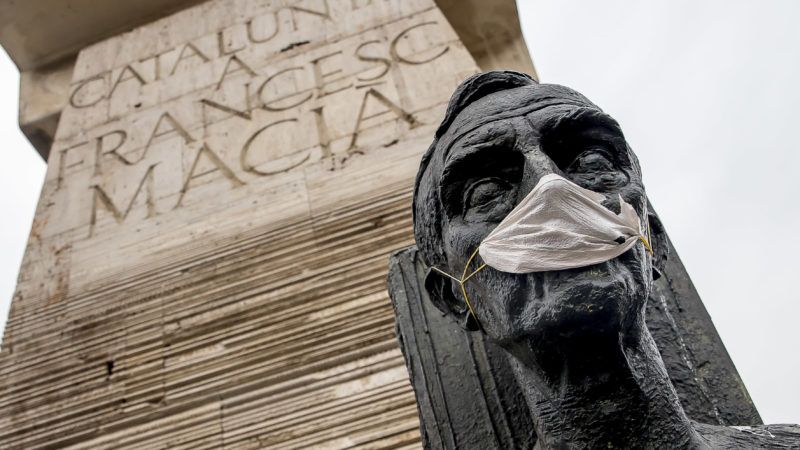Raleigh Police Department: 'Protesting Is a Non-Essential Activity'
The government has broad emergency powers, but that doesn't mean the Constitution is suspended.

In response to a protest calling for North Carolina's economy to reopen yesterday, the Raleigh Police Department arrested at least one person for violating the state's stay-at-home orders.
But wait, don't you have a constitutional right to assemble? Not so fast, says the Raleigh Police Department:
https://twitter.com/raleighpolice/status/1250111779574894594
This blithe assertion that fundamental First Amendment activities are "non-essential" did not go over well, to put it mildly.
"Enforcement of emergency orders should not exacerbate racial disparities and should not lead to custodial arrest unless doing so is the last resort, because arresting people and sending them to jail is antithetical to public health," Kristie Graunke, legal director of the American Civil Liberties Union of North Carolina, says. "The goal of enforcement should be to facilitate long-term compliance rather than to punish non-compliance."
"Even under emergency orders, the First Amendment right to protected speech, including protest speech, remain in effect," Graunke continues. "But government officials may temporarily limit in-person gatherings in circumstances where medical and scientific experts agree that assemblies of people pose an immediate and grave risk to public health. Any public health measure limiting civil liberties must be re-evaluated when the medical and scientific consensus changes."
Shea Denning, a criminal law expert at the University of North Carolina School of Government, told the Raleigh News & Observer that normal constitutional rights can indeed be overridden in a state of emergency, but that power isn't absolute:
"I think what people might be thinking about is, 'Well, don't I still have constitutional rights? And can a state statute take away my rights?'" Denning said.
The answer, she said, is yes to both: A state of emergency doesn't completely take people's rights away, but it does let the government do things that might otherwise infringe on people's rights.
Government officials cross the line when they impose restrictions that are overly broad or discriminatory. For example, the town of Greenville, Mississippi, has been attempting to shut down drive-in church services, despite the fact that the church-goers are in their cars and socially distanced. One church filed a federal civil rights lawsuit contesting the order. The Justice Department filed a statement of interest in the case, writing that the facts "suggest that the city singled out churches for distinctive treatment."
And as Reason's Jacob Sullum detailed, a federal judge issued a temporary restraining order earlier this month against the mayor of Louisville, Kentucky, who had tried to ban drive-in Easter services.
The Raleigh Police Department released a statement yesterday, after being thoroughly yelled at on Twitter, reiterating its stance. "We simply want everyone to be safe during this very serious public health crisis," the statement read.
"In these unprecedented times and unusual circumstances, both the Governor and the County have declared a state of emergency," the statement said. "Under these current and temporary declarations, protesting is not listed as an essential function."
The department said it is "having ongoing conversations with Wake County officials and the Wake County District Attorney's Office on the scope and enforcement" of stay-at-home orders.
Gathering in crowds right now is not a good idea. It's a stupid and potentially deadly one. But governors, mayors, and police claiming that protected First Amendment activities are now verboten should give every civil libertarian the heebie-jeebies. If local and state governments insist on using their broad emergency powers to enforce nonsensical, involuntary orders—like Michigan's restrictive orders or Pennsylvania's impressively dumb attempts to close liquor stores—it will only breed resentment, and the very type of civil disobedience they're trying to tamp down.
In fact, four Michigan sheriffs just announced they're refusing to enforce some of Michigan Gov. Gretchen Whitmer's stay-at-home orders.


Show Comments (75)